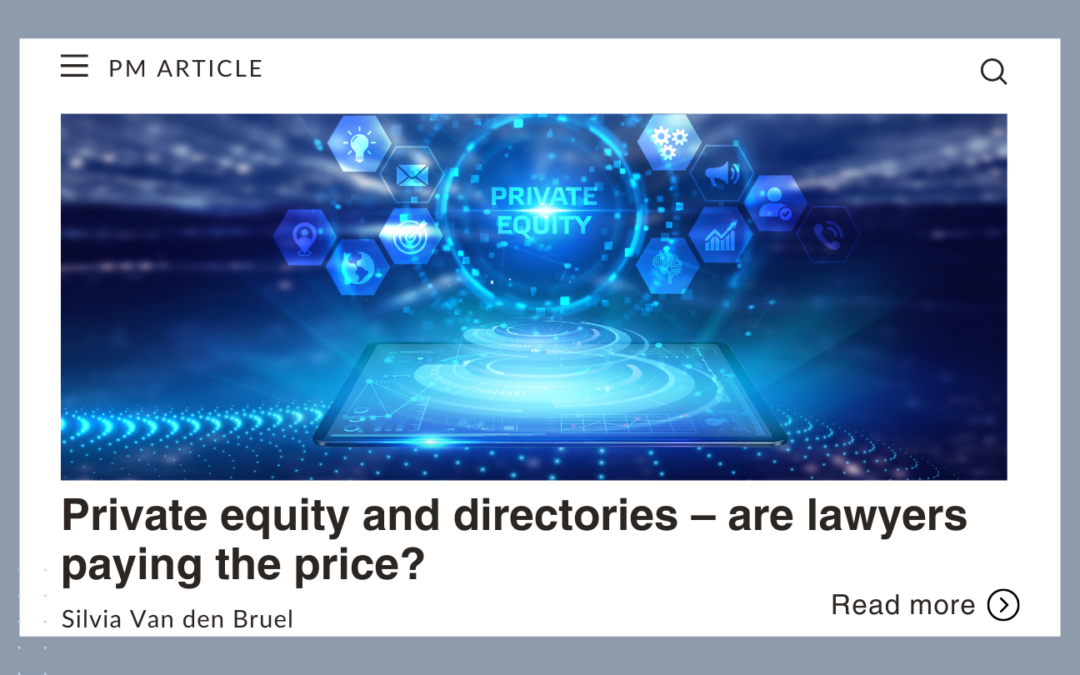Chambers was sold by its private equity owners for a staggering £400 million. Silvia Van den Bruel considers the impact of private equity ownership on its value, asking value for whom?
On 10 November 2023, Inflexion Private Equity sold leading legal directory Chambers to US investors Abry Partners in a deal worth £400 million. It is a far cry from the days when Michael Chambers and Laurence Orbach founded Chambers and Partners in 1989 when they set out to rank the best law firms and solicitors.
Combined with editorial and analysis, Chambers “offers buyers of legal services the information they need to make the most well-informed decision when it matters”. We all chuckled when Michael Chambers insisted on playing his trumpet at Chambers’ events but when he sold his stake to Inflexion in 2018 for a rumoured £30–50 million, the joke was on us.
Wikipedia says “Chambers employs some 200 editors who conduct research in 20 languages across 187 jurisdictions” which makes for a lean research team. The true genius, of course, is that the bulk of the work is ‘outsourced’ to an army of marketers and lawyers spending countless hours preparing lists of referees and writing about key cases.
Chambers’ considerable IT investment has allowed us to upload Excel spreadsheets and Word documents onto their platform for several years now. They are currently marketing a new way of uploading submissions directly onto an online platform for the upcoming 2025 edition. Uploading a word document is still possible – for now. As a result, they sit on vast amounts of data. And we all know the value of big data. Parts of their privacy policy are somewhat vague. Let me share this one sentence describing how they may use the personal information provided to them: “To promote, manage and administer our Research and other business activities.” Other business activities?
The first private equity owners transformed the business and have been effective in monetising the product. The cost of profiles has exponentially increased with no apparent price structure, such as the size of firm, size of the team and number of practice areas.
A recent email read that, per their terms and conditions, the license to use Chambers testimonials and logos is only accessible via a subscription to their platform.
It seems that contributing to their research by submitting – a key component of their model – is no longer sufficient to get to use quotes. They expanded into other business activities (!) such as insight reports, in-depth overviews, business intelligence and events. They no longer print the edition, which is kinder to the environment, and represents a serious cost saving in printing and courier costs at the same time.
The line between research and payment has faded. Today, if you do not pay, you can’t play, underscored by the different layout and website page presentation. The credibility of their research as first movers was their strength. This has, in my view, weakened over time. When I speak to my peers, complaints about the editorial and quotes ‘being too similar to the previous year’ have become more prevalent and remarks like ‘do they even read our submission?’ are more commonplace.
But what will the next stage of growth for the new PE firm be? How far will they be able to push law firms in their quest for self-validation?
The impact on law firms is not to be underestimated. Dealing with Chambers and The Legal 500 directories has become an all-consuming task between November and March and, being part of a small team, takes me away from the key focus of doing ‘real’ marketing and business development.
Not taking part as a ranked firm is totally unthinkable despite attending many conferences where in-house counsel testifies that they do not look at the rankings to determine who to instruct. Does research based on information written by the subject, submitted with a list of referees by the same subject, even make sense? It is unlikely that any of us will include a dissatisfied client and some referees depend for their pay checks on being instructed by law firms such as barristers, advisors and economists.
At a recent event, a BD director of a global law firm with some 1,000 lawyers in the UK mentioned that the cost of preparing for submissions for their London office was £750,000, most was (lost) billable time. That is insane.
With at least 30 similar firms in size in London, it seems to me the real losers are the pro bono sector, charities and all those who have strong cases but no money to pay for legal advice. Imagine how much good could be done if we were to drop this (vanity) project and all start using those hours philanthropically, given we happily part with them anyway? If that firm had monetised those hours, they could have sponsored 750 events (at a generous £10,000 a pop) offering 750 lawyers a speaking opportunity with the possibility to network and follow up. But luckily, those instructions following the rankings keep flooding in… or do they?
Marketing and business development teams have grumbled for years that they can spend their time more effectively elsewhere, and the news of PE investors banking a huge profit by making a fivefold return seemed to have woken up some lawyers too.
But the new owners of Chambers do not need to worry quite yet. By playing on lawyers’ self doubt – some claim vanity – and their desire to be ranked, this is FOMO at its best. In preparation for this article, I asked some of my (normally very chatty) peers if they wanted to share their thoughts for this piece – anonymously if preferrable – to be met by a deafening silence.
I do not see the signs of a revolt led by anyone brave, any time soon.
Silvia Van den Bruel is Marketing & BD Director at Hausfeld. Her views are her own.
Members only: if you want to add this reading to your CPD, please log in and complete the evaluation
Log in




